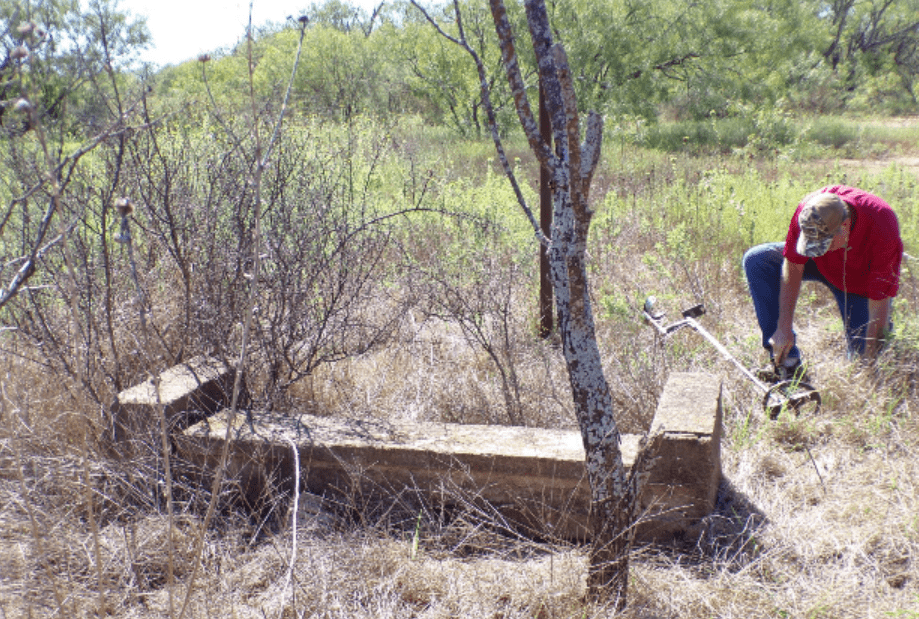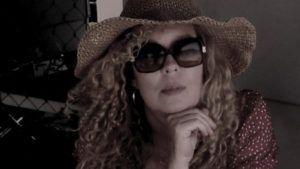
After publishing a column a few weeks ago on the Hunter Stagecoach stop, I was contacted by the owner of the property where it was located, Mandy Martin. Mandy told me that the site of the old stagecoach stop was converted into a church called Eureka Baptist. Mandy and her husband, Rick, graciously allowed Tommy Faught, artifact specialist from the Central Texas Treasure Club, and me to come out and see what is left of the church, along with some other historic sites on the property. As the location of the old stagecoach stop, owned and operated by William Hunter and his wife, Louisa, and then a small local church, the history out there is incredibly rich.
William Hunter, son of Malcolm and Nancy Hunter who settled along the Jim Ned Creek in 1860, built his home and business in between the town of Thrifty and the military post of Camp Colorado. Some of Hunter’s memories of the early days were recorded in Ralph Terry’s book, A History of Coleman County and Its People, describing what things were like in the early days of settlement. “…The family learning to live on the wild game that covered the rolling prairies; deer, antelope, wild turkey, and the ubiquitous buffalo. Climbing to the top of the bluff overlooking the Jim Ned Creek to see the prairies black with 1000s of the big beasts.” … “As a lad of eleven going with his dad to Camp Colorado and General E. Kirby Smith, Camp Commander, giving them a steel hand mill, which they nailed to a tree at their home on the Jim Ned, and neighbors coming to grind their corn.” In the entry on William Hunter, a few details on the stage stop were recorded as well. “W. W. and his older brother, John, kept the stage stand on his place on Mud Creek. The Pony Express was the only through transportation and the stage line ran from Fort Worth, Texas, to Yuma, Arizona, with a stand every twenty miles, where they stopped twice a day and changed horses. The stage would blow a horn when within hearing distance, and the Hunter boys would have four horses harnessed and ready for them when they stopped.”
William and Louisa were charter members of Eureka Baptist Church, donating some of their land for the site. The church land was deeded by the Hunter family to the institution in 1901, with the caveat that the land would return to the family in the event that the church dissolved. I’m not certain when services ended at Eureka Church. While we were out exploring the site, a man named Tom Sykes stopped to chat with Rick. He recalled the building was still standing in the 1980s, and gradually falling down until the ruins were finally bulldozed.
One of the Hunter sons, Enoch, along with his wife Etna, built a home on the Martin’s land, farming in both Coleman and Brown counties, as the property borders the county line. We were able to view an old rock well or cistern that appears to be very primitive, and a fallen structure which might have been Enoch Hunter’s home. Tommy found a tire changing tool for a Model T near the possible home, which would indicate it may have been occupied until perhaps the 1920s or 30s. We plan to do more research on this, hoping to find out for sure where the homestead was, in order to get a glimpse into how this early ranch operated.
Driving by the Martin’s field, you would be hard put to notice that anything was ever there. One hundred and twenty years ago, that field must have rung with the shouts of children just out of church service. Fifty years before that, the echo of the stagecoach horn would have carried over what is today an empty field. These ruins, like many others in our area, are fast disappearing, but Mandy and Rick care deeply about the history of their land. Hopefully, this historic spot can be further explored, recorded and preserved so that future generations can experience the same powerful connection to the past that we did while viewing it.
***
Diane Adams is a local journalist whose columns appear Thursdays on BrownwoodNews.com. Comments regarding her columns can be emailed to [email protected].
